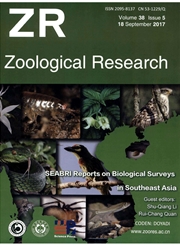

 中文摘要:
中文摘要:
三叶因子(trefoil factor, TFF)家族是具有一个或多个三叶因子结构域的蛋白质多肽,在进化上具有高度的保守性,具有耐热、耐酶消化的理化特性。哺乳动物的TFF有三个成员(TFF1、TFF2和TFF3)。黏膜组织,如胃肠道和呼吸道黏膜等是TFF的主要合成场所。生理条件下,TFF的分布具有组织专一性,具有黏膜保护和创伤修复作用。TFF在肿瘤组织中广泛表达,在肿瘤的发生、发展、侵袭、转移过程中发挥着重要作用,可能是癌基因在对不同刺激做出反应时的共有递质。TFF生物学功能存在一个复杂的调控过程,单链TFF可通过膜受体而激活相关信号通路,TFF也可以通过与其它蛋白质的结合而协同发挥作用。TFF在临床医学领域主要运用在黏膜保护、黏膜损伤相关疾病的预防和治疗及肿瘤病理的诊断与干预等方面。TFF的作用机制和功能行使相关信号通路仍然是目前研究的重点,TFF与βγ-晶状体蛋白天然复合物的发现有助于对TFF的进一步认识和深入研究。
 英文摘要:
英文摘要:
Trefoil factor (TFF) family is a group of peptides with one or several trefoil factor domains in their structure, which are highly conserved in evolution, and are characterized by heat and enzymatic digestion resistance. The mammalian TFFs have three members (TFF 1-3 ), and the gastrointestinal tract and the airway system are major organs of their expression and secretion. At certain physiological conditions, with a tissue-specific distribution, TFF plays an important role in mucosal protection and wound healing. But in the malignant tissues, TFF is widely expressed, correlated strongly with the genesis, metastasis and invasion of tumor cells. These phenomena indicated that TFF may be a possible common mediator of oncogenic responses to different stimuli. The biological functions of TFF involve complex regulatory processes. Single chain TFF may activate cell membrane receptors and induce specific signaling transduction. On the other hand, TFF can form a complex with other proteins to exert its biological effects. In clinical medicine, TFF is primarily applied as drugs in the mucosal protection, in the prevention and the treatment of mucosal damage-related diseases and as pathological biomarkers of tumors. At present the first hand actions and the molecular mechanisms related to TFFs are still the major challenges in TFF research. Furthermore, the discovery of the naturally occurring complex of TFF and crystallins is highly valuable to the understanding of the biological functions and action mechanisms of TFF.
 同期刊论文项目
同期刊论文项目
 同项目期刊论文
同项目期刊论文
 Cell migration-promoting and apoptosis-inhibiting activities of Bm-TFF2 require distinct structure b
Cell migration-promoting and apoptosis-inhibiting activities of Bm-TFF2 require distinct structure b Characterization of the betagamma-crystallin domains of betagamma-CAT, a non-lens betagamma-crystall
Characterization of the betagamma-crystallin domains of betagamma-CAT, a non-lens betagamma-crystall Establishment, characterization and immortalization of a fibroblast cell line from the Chinese red b
Establishment, characterization and immortalization of a fibroblast cell line from the Chinese red b Activation of protease-activated receptor (PAR) 1 by frog trefoil factor (TFF) 2 and PAR4 by human T
Activation of protease-activated receptor (PAR) 1 by frog trefoil factor (TFF) 2 and PAR4 by human T betagamma-CAT, a non-lens betagamma-crystallin and trefoil factor complex, induces calcium-dependent
betagamma-CAT, a non-lens betagamma-crystallin and trefoil factor complex, induces calcium-dependent Two novel families of antimicrobial peptides from skin secretions of the Chinese torrent frog, Amolo
Two novel families of antimicrobial peptides from skin secretions of the Chinese torrent frog, Amolo beta gamma-CAT, a non-lens beta gamma-crystallin and trefoil factor complex from amphibian skin secr
beta gamma-CAT, a non-lens beta gamma-crystallin and trefoil factor complex from amphibian skin secr Melanoma cell growth inhibition by beta gamma-CAT, which is a novel non-lens betagamma-crystallin an
Melanoma cell growth inhibition by beta gamma-CAT, which is a novel non-lens betagamma-crystallin an A Novel Non-Lens beta gamma-Crystallin and Trefoil Factor Complex from Amphibian Skin and Its Functi
A Novel Non-Lens beta gamma-Crystallin and Trefoil Factor Complex from Amphibian Skin and Its Functi Acute toxicity of beta gamma-CAT, a naturally existing non-lens beta gamma-crystallin and trefoil fa
Acute toxicity of beta gamma-CAT, a naturally existing non-lens beta gamma-crystallin and trefoil fa A novel annexin A2 protein with platelet aggregation-inhibiting activity from amphibian Bombina maxi
A novel annexin A2 protein with platelet aggregation-inhibiting activity from amphibian Bombina maxi 期刊信息
期刊信息
